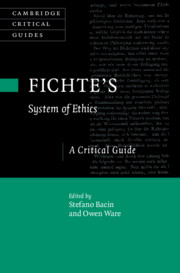Book contents
- Fichte’s System of Ethics
- Cambridge Critical Guides
- Fichte’s System of Ethics
- Copyright page
- Contents
- Contributors
- Acknowledgments
- Abbreviations and Translations
- Introduction
- Chapter 1 Fichte’s Ethics as Kantian Ethics
- Chapter 2 Fichte on Normativity in the Late Jena Period (1796–1799)
- Chapter 3 Fichte on Autonomy
- Chapter 4 Feeling, Drive, and the Lower Capacity of Desire
- Chapter 5 Fichte and the Path from “Formal” to “Material” Freedom
- Chapter 6 Fichte on the Content of Conscience
- Chapter 7 Fichte’s Theory of Moral Evil
- Chapter 8 Embodiment and Freedom
- Chapter 9 Ethics as Theory of Society
- Chapter 10 My Duties and the Morality of Others
- Bibliography
- Index
- Cambridge Critical Guides
Chapter 7 - Fichte’s Theory of Moral Evil
Published online by Cambridge University Press: 20 May 2021
- Fichte’s System of Ethics
- Cambridge Critical Guides
- Fichte’s System of Ethics
- Copyright page
- Contents
- Contributors
- Acknowledgments
- Abbreviations and Translations
- Introduction
- Chapter 1 Fichte’s Ethics as Kantian Ethics
- Chapter 2 Fichte on Normativity in the Late Jena Period (1796–1799)
- Chapter 3 Fichte on Autonomy
- Chapter 4 Feeling, Drive, and the Lower Capacity of Desire
- Chapter 5 Fichte and the Path from “Formal” to “Material” Freedom
- Chapter 6 Fichte on the Content of Conscience
- Chapter 7 Fichte’s Theory of Moral Evil
- Chapter 8 Embodiment and Freedom
- Chapter 9 Ethics as Theory of Society
- Chapter 10 My Duties and the Morality of Others
- Bibliography
- Index
- Cambridge Critical Guides
Summary
Features of Fichte’s ethical theory point to a radical moral individualism, on the one hand, and a form of social ethics, on the other. I argue that Fichte’s theory of moral evil contains both elements, but that locating the source of moral evil in social factors would amount to a form of social determination that is incompatible with Fichte’s understanding of moral autonomy. Fichte’s explanation of moral evil in terms of a natural force of inertia, when viewed in conjunction with the clear consciousness of duty required by conscience, generates a paradox concerning how an individual could ever be considered responsible for the state of moral evil which he or she is in. In response to this paradox, I argue that Kierkegaard’s account of the concept of anxiety provides some resources for overcoming this difficulty faced by Fichte’s theory of moral evil, though only if an element of social influence is introduced. Even then, however, this theory will be shown to generate certain problems.
- Type
- Chapter
- Information
- Fichte's System of EthicsA Critical Guide, pp. 131 - 149Publisher: Cambridge University PressPrint publication year: 2021

